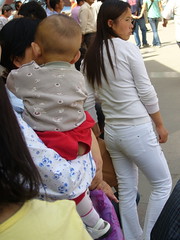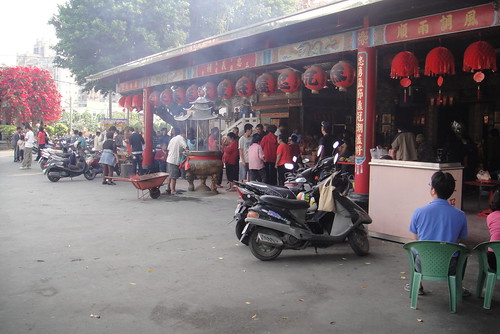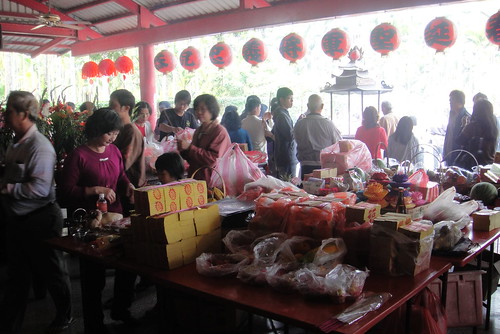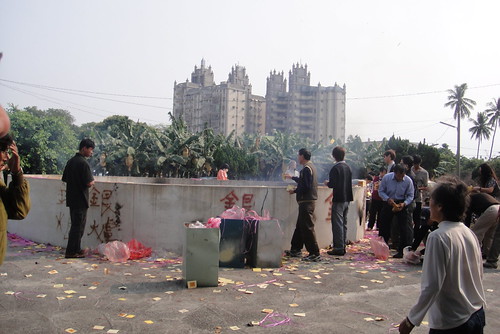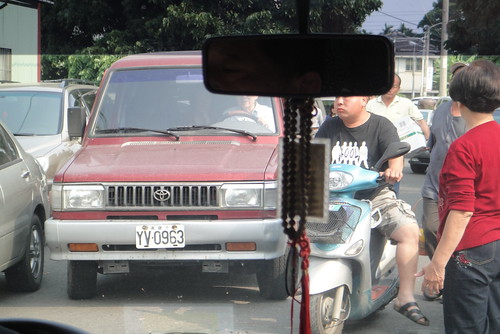What started this post was this video posted to facebook by one of my former students. It was filmed at our school:
___Popout
___So, let’s back up a little, first
what is 台客 (tai ke)?

This is actually quite difficult to answer. I’ve heard the term “tai ke” could be likened to the term “redneck” or “white trash.” Meaning it is a certain subculture that is looked down on by the mainstream culture because of class, economic standing, and/or beliefs.
Lawrance also likened it to the hip hop culture–a subculture that is proud of who they are and where they come from that sets trends in music and clothing.
The New York Times says it is “a phrase that originally meant ‘redneck’ but has now come to encompass a youth-focused lifestyle that celebrates both the déclassé (flip-flops, Long Life cigarettes) and the haute (Gucci, Macallan).”
But, this seemingly simple term for subculture also is seeped in socio-political, historical implications. Historically, tai ke was “used by those post-1949 mainland Chinese arriving in Taiwan with the KMT regime.” At that time, “the term connoted ethnic discrimination towards native Taiwanese and was used specifically to articulate perceptions of their unsophisticated outlook and behaviour” (Taike rock and its discontent).
See, literally “tai ke” means “Tai guest.” So, the mainlanders were calling the Taiwanese and Hakka people who had been on the island longer than them–guests.
But, now, thanks to Wu Bai, who has been called the king of tai ke, and the commercial efforts of music companies, the term’s negative meaning has “been subverted and is now given a positive touch to mean ‘coolness’ and confidence” (East Asian Pop Culture). Wu Bai sees tai ke as a “direct expression of national culture.”
However, if you ask local Taiwanese people about what is “tai ke” they won’t refer to the historical or political implications. And, most won’t tell you that it means “cool and confident.” Instead, they will begin describing stereotypical actions of the people they consider to be “tai ke,” telling you how they drive, speak, and even chew.
Here are some things that are stereotypically thought to be “tai ke”–people who wear white and blue plastic slippers outside, have low education, chew betel nut, smoke and drink heavily, have cheaply dyed golden hair, wear imitation name-brand clothing, and hang out around temples or internet cafes, and participate in temple parades. There are even more stereotypical characteristics and behaviors; but, more than actions and behavior, being “tai ke” is a possessing a certain attitude.
So, nowadays, telling someone who is not “tai” they are “tai” is meant to be an insult. It would be like telling someone they have no class or are being disrespectful. But, those who actually are “tai” find pride in being “tai.”
And, while most people in Taiwan look down on things that are “tai ke,” there is also a sense of pride across Taiwan for some of the things that have come out of the “tai ke” subculture because it is uniquely Taiwanese (This is especially true in southern Taiwan).
“Tai ke wu” is one of these things.
OK. So, that brings us back to
what is 台客舞
(tai ke wu)?
It is a group dance–similar to country line dancing in that lines of people do the exact same moves at the same time. And, that lots of people know how to do the dance.
And, like the fact that the subculture is mostly about a embodying a certain attitude so is the dance. As I was searching for videos, I saw one Taiwanese celebrity explain that although the foot work is easy, the arm movements and attitude that one has to portray is what makes the dance so special and difficult.
Lawrance pointed out to me that since the dance originated from people who participate in temple parades and hang out at temples, they naturally incorporated certain movements and feeling from temple parade marches that are made when carrying an idol down the street.
There are several videos on youtube showing students doing the “tai ke” dance. Here is what seems like the most watched “tai ke wu” video on youtube. It starts off as a group dance, but dancers back off one by one because one guy is so much better than the rest. All the shouts and screams coming from the sidelines are people expressing their admiration for how great he is doing. This was funny to me at first because originally I thought he was doing a poor job (kinda sloppy on the moves), but the more I learned about tai ke wu the more I realized it was all about embodying a certain attitude–and this guy’s got it.
___
___I liked this one that invited their teacher to join in, and she did. Throughout the video, everyone is impressed with the middle student’s dancing ability–again, she’s got a certain attitude going.
___
___And finally here is a modified tai ke wu (an aerobic exercise version) on the news . . . with all ages participating and the mayor of Kaohsiung promoting it. In this video, you can see people in costume dancing as gods on stage–this is what Lawrance was talking about . . . and we’ll get into more in depth tomorrow.
___
